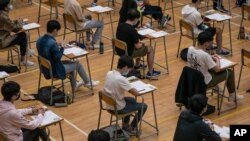Primary and secondary schools in Hong Kong are facing a steady exodus of students in the wake of a draconian national security law that has ushered in a citywide crackdown on public criticism of the authorities, according to a major teachers' union.
According to a recent poll of 180 schools by the city's Professional Teachers' Union, hundreds of pupils look set to leave schools in Hong Kong by the summer vacation.
More than half of schools said more than 10 of their students were leaving, while four schools noted an exodus of more than 50 students during this semester.
PTU head Fung Wai-wah said many parents are emigrating overseas amid safety concerns, as a newly established force of national security police have been arresting people for peaceful political activities deemed harmful to Hong Kong.
In January, 47 pro-democracy activists and former opposition lawmakers were arrested on suspicion of "subversion" under the national security law, for taking part in a democratic primary election that was designed to maximize the number of opposition seats in the Legislative Council.
Chief Executive Carrie Lam responded by postponing the LegCo elections until December, prompting the mass resignation of the rest of the opposition camp.
The government has also imposed requirements on the city's schools to "educate" students about the national security law, and to monitor students and teachers alike for any sign of dissent in or outside the classroom.
"Decisions in education are now being made based on the whim of the ... government, rather than on professional considerations," Fung said. "Subjects and teaching materials are being changed all the time, there is interference with the assessment process."
"Teachers can lose their teaching license if someone complains about their professional conduct, so they are under huge political pressure," he said.
"The [government] needs to work much harder to reassure parents."
PTU vice president Ip Kin-yuen said some students are even being taken out of school in the middle of the academic year.
'A lot of headache'
"The people leaving are evenly distributed across different age groups, so it is really affecting the structure of schools, and causing a lot of headache for management," Ip said.
Fung called on the authorities to dial back their interference in the day-to-day running of schools, and to start treating teachers with more respect, if they want to regain parents' trust.
"The government is actually turning a blind eye to the issue, by denying that there is a problem," Fung said. "They have to take this more seriously ... and take constructive steps to try to remedy the situation."
Between 13,100 and 16,300 Hong Kong holders of British National Overseas passports and their families look set to emigrate to the U.K. under a fast-track program extended by the U.K. government in response to the national security law.
Meanwhile, a new visa program for people wanting to settle in Canada has attracted some 6,000 applications since its launch in February, Bloomberg reported.
Applications to police for certificates of no criminal record, a prerequisite for some emigration programs, reached 11,700 in the first four months of this year.
Statistics from Hong Kong's education bureau showed that the number of primary and secondary school students fell by 19,379 compared with the same time last year, while 5,285 students had recently left private schools during the same period.
Many want to leave
Educator Dion Chen, who is currently chairman of Hong Kong Direct Subsidy Scheme Schools Council, said its schools were also losing students at a rapid rate.
"It's not just about the national security law, but also about the overall situation in Hong Kong over the past couple of years," Chen said.
"Large numbers of people want to emigrate ... and they have a much bigger incentive now that certain countries have relaxed the immigration rules for people from Hong Kong," he said.
Yeung Tze-chun, a former liberal studies teacher, said direct subsidy schools have been harder hit, as families are more likely to have the financial resources to leave.
He said the exodus from Hong Kong's schools could prompt competition and poaching of students among elite schools in the city.
"I can only see the situation getting worse in future," Yeung told RFA.





